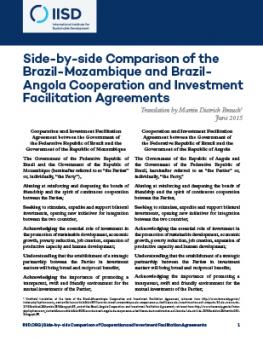
Side-by-side Comparison of the Brazil-Mozambique and Brazil-Angola Cooperation and Investment Facilitation Agreements
Brazil has developed a new model investment agreement, the Cooperation and Investment Facilitation Agreement (CIFA). Unlike traditional bilateral investment treaties (BITs), which are geared towards investor protection, CIFAs focus less on investor protection and more on institutional arrangements and agendas for investment facilitation and cooperation.
Brazil has developed a new model investment agreement, the Cooperation and Investment Facilitation Agreement (CIFA).
Unlike traditional bilateral investment treaties (BITs), which are geared towards investor protection, CIFAs focus less on investor protection and more on institutional arrangements and agendas for investment facilitation and cooperation. They promote amicable ways to settle disputes and propose state–state dispute settlement as a last resort. Notably, CIFAs do not include provisions on investor–state arbitration.
CIFA negotiations were launched in 2013. Between March and May 2015, Brazil concluded the first three agreements, with Mozambique, Angola and Mexico. Negotiations with Malawi are reported to have been concluded, and Brazil is also negotiating with Algeria, Chile, Colombia, Morocco, Peru, South Africa and Tunisia.
You might also be interested in
Why the Energy Charter Treaty Modernization Doesn't Deliver for Climate
The Energy Charter Conference adopted the "modernized" Energy Charter Treaty (ECT) on December 3, 2024. IISD's Lukas Schaugg explains what the modernization does, when it will enter into force, its tension with EU law, and why the reformed ECT can still hinder climate policies.
The Responsible Agricultural Investment Tool for Agribusiness and Case Studies
This report summarizes a collaboration to support agribusinesses in complying with principles of responsible investment in agriculture and food systems.
Stabilization Clauses: The hidden provisions that can hinder tax and investment policy reform
Stabilization clauses should no longer automatically be included in contracts between states and investors. If they are, they should, at a minimum, build on the latest international standards on stabilization to avoid being a barrier to sustainable development.
What Drives Investment Policy-makers in Developing Countries to Use Tax Incentives?
The article explores the reasons behind the use of tax incentives in developing countries to attract investment, examining the pressures, challenges, and alternative strategies that exist.